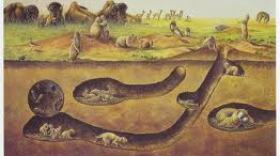On this edition of ST, we speak with Dr. Miriam Belmaker, an assistant professor of anthropology here at the University of Tulsa as well as a paleoanthropologist who studies the remains of small rodent species to determine environmental effects on human dwelling places and communities -- and on humanity's ancient ancestors. In doing so, she studies how changes in the climate over the past two million years may have affected human development and evolution. Her very interesting work, which she chats with us about today, currently takes her to a number of different sites, including still-in-progess digs at Bethsaida (an important city in biblical history located in Israel on the Sea of Galilee), Amud Cave (a paleolithic gorge/region, also in Israel, that housed Neanderthals), and elsewhere. Indeed, as we learn from Dr. Belmaker, TU students as well as members of the public are being encouraged to sign up for a "dig trip" to Israel later this year that will focus on working at the Bethsaida site. You can learn more about this trip by checking out the TU Center for Global Education's website...or by contacting Dr. Belmaker directly at miriam-belmaker@utulsa.edu.
Studying Climate Change Over the Long Term -- the Very Long Term -- with TU's Dr. Miriam Belmaker










